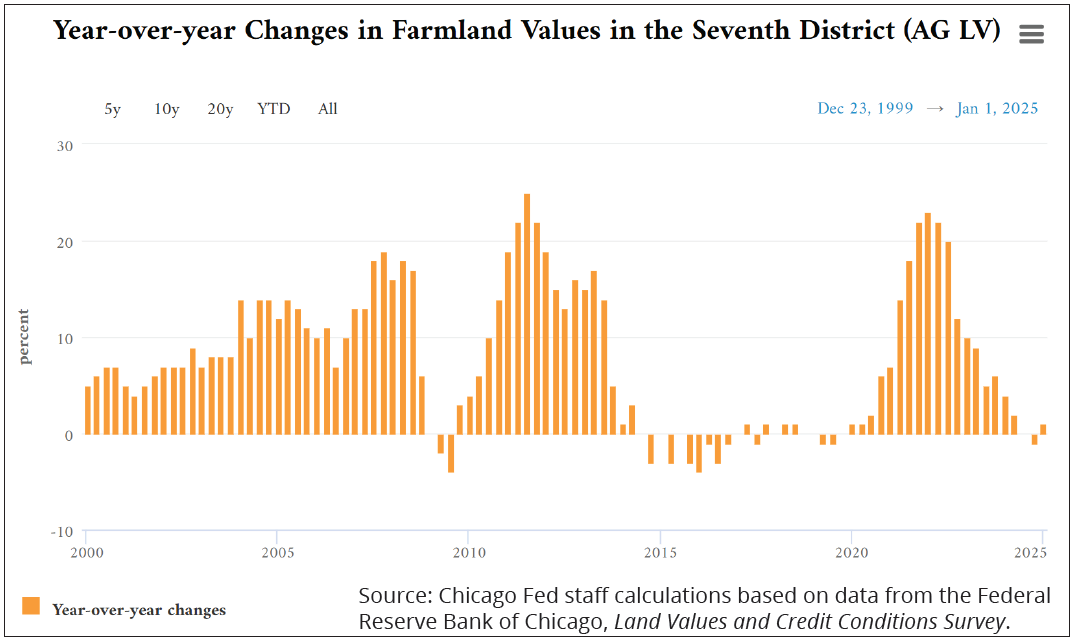Economic Uncertainty Increases Value of Owning Land
__primary.png?v=1750189832)
What would you rather own today, more than a farm? Stocks? Bonds? Development property?
In this time of market uncertainty, it’s a great time to own farmland, notes Doug Hensley, president of Hertz Real Estate Services. Throughout the economic cycles of the past 25 years, farmland has shined – through the 2000-2002 Dot-com crisis, the 2008 housing crisis, and through the 2020global COVID-19 pandemic.

While we are not facing a new crisis, current land values are holding steady despite emerging economic uncertainties, according to Hensley. “It appears the farmland market hit its recent low point around last year’s harvest,” he notes. “Throughout most of 2024, values had remained flat. As harvest approached, there was uncertainty around yields, commodity prices were soft, and higher input costs loomed. That combination led to some buyer hesitancy last fall.”
“Then, we harvested a better than expected crop. And the budget bill that passed in December 2024 allocated $10 billion in direct payments for farm country. As the news of that disseminated in January, we enjoyed a really nice rally in commodity prices, and those who had missed selling their ’24 crop for a profit months before, got another chance,” Hensley adds. “These things combined to inspire confidence again.”
“Today, our economy is in a kind of limbo again,” says Hensley. Tariffs, trade, and geopolitics have stolen the show. Since the beginning of April, many landowners who may have considered a farm sale have decided to take a wait-and-see attitude. “People don’t like selling land or any other asset when they don’t fully understand how the market is behaving, which has limited sale volume,” Hensley explains. But that lack of supply is also keeping a floor under farmland values. “Relative to recent years, we haven’t seen very many farms for sale in the first quarter of 2025,” Hensley reports, and “high quality farms being offered for sale are attracting strong interest.”
“So, if you are looking to sell a farm for a strong price, you can do so with confidence because there is little else for sale,” advises Hensley.
“I get it, and it makes sense when you think practically about it. People like to hang on to hard assets in the face of an uncertain economy. And that uncertainty is at a level we’ve not seen in several years,” says Hensley. “And, beyond the sale uncertainty, when people sell a farm, they want to know what they are going to do with their money – buy stocks, invest in a business, trade into development or other investment property, etc. Today, they are unsure,” he adds. “And that uncertainty breeds indecision and a slow market.”
This new uncertainty across the U.S. (and world) economy has added to the annual agricultural uncertainties that we are used to during a normal growing season, notes Hensley. As we head into the summer growing season, the commodity markets tend to set the direction for corn and soybean prices. We had an excellent planting window this spring. So, as summer weather patterns shape up, we’ll know more about the outlook for this year’s crop, resulting farm incomes, and how land values may trend. We also have an expectation that the geo-political uncertainties will settle, compared to the first half of 2025.
And as the land market of the past year has shown, even when farm incomes drop, there is still resiliency in farmland values. Over the past couple years, farm income has dropped 25%, but land values over the same time period only slipped marginally in comparison, says Hensley. “And since January 1, we’ve seen land values firm up.”
Compared to other investments, farmland has several strong advantages:
- Unlike paper assets, land is not going to disappear.
- There is rarely any vacancy with Midwest farmland.
- You don’t have to remodel when you get a new tenant. It won’t rust, rot, or need paint.
- Farmland builds wealth as it is positively correlated with inflation, and allows for wealth transfer between generations.
- Price fluctuations are gradual and tend to be resilient over time.
- Farmland offers a consistent annual cash income.
Continued ownership of any asset is based on current needs and future expectations. Sellers of farmland today certainly have legitimate and rational reasons. The question any landowner must answer is, “What would you rather own right now?”









